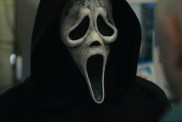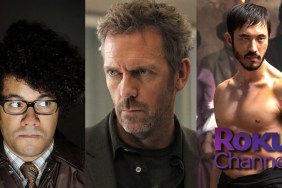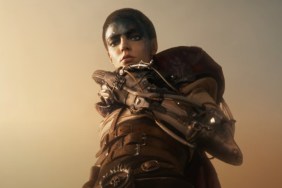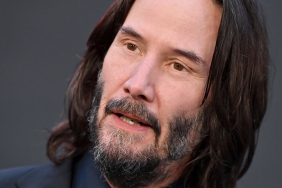It’s been over eight years since we heard from Allen and Albert Hughes a.k.a The Hughes Brothers when they directed the movie From Hell, starring Johnny Depp. Now, they’ve returned with The Book of Eli, a post-apocalyptic action flick that teams them with Denzel Washington as a loner crossing the wastelands on a mission from God. This is a violent world where everyone is doing whatever they can to survive even if it means killing and stealing the less fortunate, and when Eli arrives at a thriving town, he falls foul of its overlord, Carnegie, played by Gary Oldman.
As was the case with the Hughes’ earlier films, The Book of Eli is a great-looking movie, one that allows them to shine at what they do best, which is when Eli cuts loose on the rabid gangs of predators he meets on his journey, fights that result in severed limbs, gunfire and big explosions.
Last July at Comic-Con, ComingSoon.net had a chance to sit down the Hughes and talk about how the film originatedthis was before we had a chance to see the movie, though, just the first trailer which premiered there.
ComingSoon.net: I’m sure the question you guys are getting constantly now is “Where have you been?” “From Hell” was in 2001, so have you guys been developing other movies since then and working on stuff and this just happened to be the one that finally moved forward?
Allen Hughes: I think Albert said it earlier (at a press conference they did), it’s not like you decide one day you’re not going to work. You try to work, and we’ve been attached to things and we’ve tried to chase things down and gotten them and then the variables change, so there were various projects. And we’ve shot a lot of ads in the meanwhile, too. It wasn’t like we weren’t trying to make a film, it’s that the material was never ready and/or the studio was never ready to make the material we wanted to make.
Albert Hughes: ‘Cause it’s one thing to just go out and make any old movie, you know? We’d rather fall on our swords and make a bad movie in hopes that we were attempting to make a great movie, and we may not have reached that or whatever, but what we’re looking for is something special or what we think is special, at first, and we don’t look at it as a paycheck or “We gotta put something on the market just to get money for ourselves.” We had the opportunity to do ads and stuff like that, which I don’t enjoy that much, but Allen knows how to work in that world very effectively. They’re very fast and you get over it quick. It affects me differently. It made me love movies more, the freedom of movies, but you learn a lot on commercials. You learn about the politicking side of the corporate world, which is what movies are turning into anyway, so in the end, if you look at our short history here in movies, the quickest turnaround was from “Menace” to “Dead Presidents.” After that, it was a five or six-year off period, and again, it wasn’t a conscious decision of “Let’s take six years off.” We were like, “We’re going to go live our lives and if something comes up special fine, if not…” Also, it’s youth… we’re not that experienced about knowing how to pare through all this stuff. Right now, we are more experienced but at the same time, we’re getting more and more finicky, and we’ve always been, because they’ll send us a lot of stuff.
CS: Did you do a lot of your earlier movies independently or were they always with a studio involved?
Allen: It always felt independent except for “From Hell” which was Fox, and that’s the other thing. We started in the independent world and it wasn’t like a coincidence. We were independent-minded so it was very hard to work within the studio system. Even after doing commercials, it’s still difficult. It’s funny, but you can’t put in a nutshell what takes eight years, but I can just say, “Life.”
CS: A movie like this, because it’s bigger, you’d have to do it through a studio, so did this project originate with you guys or was it a script you found and brought to Warners?
Allen: It was a spec script that Warners had with Joel Silver, and then no one was paying attention to it, and we paid attention to it and we defined it, came in with a look and a vision and a take and with an idea of whom the star should be, and they reacted.

CS: How did you convince Denzel and Gary Oldman to do it? Gary’s pretty open to a lot of different genres, but Denzel is a little pickier and only makes one or two movies a year. What was your pitch to him?
Allen: I think when I read it, Albert and I talked about three or four guys and I know when Denzel came up, all the lines started singing to me, like I could just see it at that point, and so we sent it to him, and he responded. I knew when I read the dialogue, I knew he could do it. It’s a role where he doesn’t talk much and that’s something he hadn’t done before, and when we decided we wanted to send it to him, something in my gut said that he would respond to it, because it just felt like him. Not Denzel, but something he should do, and once he responded and got attached, it was easier to go up to other cast. But Gary actually came to it… it’s not like a traditional villain, not like he’s twisting his moustache, that’s why he responded. It’s not a villain, it’s a human being who has to do a lot of bad things to get things done, so there’s a lot of gray there, so that’s why Gary responded as well as Denzel being in the movie.
Albert: And I think he liked us a bit.
CS: Was the Western aspect of it always in the script and that was always part of the vision?
Allen: Yeah, I think from the writer, he was the one to probably coin that phrase, “Post-Apocalyptic Western” and the studio was kind of scared of it, but his original script had a lot of tippin’ the hat to that, but once we got involved, we naturally do that with every movie. Even “From Hell” has Western elements about it. “Dead Presidents” definitely had some Western elements, but it’s more a style, being influenced by Sergio Leone and simplicity in style. Also the thing that we picked up from Sergio is that although the story is big and grand and beyond belief sometimes, the characters felt lived in and real. The way he shot some of those things was just a big canvas, the big sky and landscape, so we didn’t shy away from his style this time. I think if people want to put a label on something, fine, and when they see the movie, they’ll see it is what it is. It’s not “Mad Max,” it’s not a Western, it’s none of those things.
CS: Someone else mentioned that earlier, that “The Road” is finally going to come out a few months before your movie, but also the latest “Terminator” was shot in New Mexico and has some similar landscapes, so do you have to worry about those comparisons or do you think it’s different enough?
Allen: I think Albert said it earlier that every year there’s a million cop movies made, and of those million, ten are successful… and they’re successful because they’re telling a great story or there’s something about them that’s different or the characters so there’s not a lot…
(At this point, the interviewer makes a comment about the loud yelling going on in the room between Denzel and Mila Kunis who are a few tables away doing their own interviews, and Albert turns around and starts yelling at them for disturbing their interview.)
Allen: So yeah basically, if you take all of the cop movies that are made every year and you go, “What is successful out of those movies?” and you take all the post-Apocalyptic movies that are made every year, which is zero… this happens to be the first time where in a three year span there’s probably three or four post-Apocalyptic movies, which is still relatively small compared to horror and other genres.
Albert: Or romantic comedies.
CS: I was curious… have you guys ever had any aspirations to do horror?
Albert: I had one at one time that I was developing and I was in pre-production on it, and I just got out of it for some reason, but I would be into it if it was a smart thing. It just has to be smart and different and not so much based in horror as much as it being a great script that happened to be horror.
Allen: See, he has a different opinion. Half of the argument is that it’s not about the genre. I’m sure that if he gets a good script tomorrow and it happens to be a horror but it was a good script.
Albert: But whenever I see a commercial for a horror film, I’m not like jumping around…

CS: Right, right. Every once in a while, something comes along like “The Orphanage” that’s really different…
Allen: Yeah, yeah, that was pretty good I thought. (In hindsight, we realized he might have thought we referring to the Warner Bros. movie “Orphan” which came out that same weekend, but we hadn’t even seen at this point.)
CS: I wanted to ask you about a scene in the teaser, the scene where Denzel is fighting a bunch of guys around him, which seemed to have been influenced by “Old Boy.” Are you guys influenced by that kind of stuff?
Allen: That is the one time that somebody finally caught that. That was the organic influence. Working with Denzel, everything is grounded in reality and just a man who is a salt of the earth type and not affected by the traditional things you do in these types of movies. He likes reality, we like reality, but we also have to heighten it, and so “Old Boy” was something that was interesting when you look at that one take (fight) and we go, “How do we take the organic quality of that take and hyper-stylize it?”
Albert: ‘Cause Allen had come to me about “Old Boy,” saying “You’ve got to see this one fight scene.” The story behind it was interesting, too, ’cause he was just taking on these 15 guys and it’s not even about the shot, it’s just about him taking out these guys, and it was more an organic influence. It’s okay, you can do something like this, but let it play organically within our world basically, which is the weapons he uses, his fighting style and these guys coming at him, and all we were tied to was doing the 360, because I wanted it to be almost like a stageplay. You can set the camera up and the play can go on in front of you and that’s fine. Same thing with the 360. Even though it might have been an exciting kind of move, the camera’s not moving, it’s not panning, they’re just moving around so you get more angles on the fight, that’s it.
Unfortunately, that’s all the time we had with the guys. Later that evening, we had a chance to talk with Park Chan-wook, the director of “Old Boy,” and we got to tell him about the influence his movie had on the Hughes’ and he admitted to us he was a fan of their work as well. How cool is that?
The Hughes’ Brothers The Book of Eli opens nationwide on Friday, January 15.









